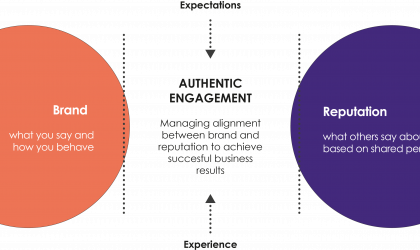
Innovation and change: how do you achieve it?
To keep up as a communication professional, you must understand new technology and embrace current themes, such as generative AI and ESG. But above all: get other people on board. How do you achieve it?
October 5, 2023

According to more than 60% of respondents, sustainable development initiatives should be approached in a fundamentally different way than other strategies. This is evident from research by our sister agency Daggerwing, a strategic consultancy firm, who investigated business strategies that can contribute to sustainability objectives. The study was conducted in collaboration with Harvard Business Review among 528 people who are familiar with the strategies in their company. Two of our ESG experts dive into the most important insights: Marjolein Rigter, Business Director of Reputation Management, and Floriane van Alphen, MSc Sustainable Development, Client Advisor.
Marjolein shares: “Explain what you do, and do what you say. It appears to be one of the success factors of sustainability leaders. Together with Harvard Business Review, our sister agency Daggerwing investigated what distinguishes leaders in sustainability from companies that simply participate. Only 1 out of 4 companies that have operationalized sustainable business practices is a true leader. For example, they set measurable goals with a specific end date. They make their entire organization part of the transformation and ensure that sustainability strategies are easily understandable.
We see in our daily practice, as communication sisters of Daggerwing, that this goes much further than avoiding technical terms and jargon. The point is to explain exactly how certain initiatives work and contribute to a better future. With a tailor-made story for every target group. Not a technical story, but a human story. A story that focuses on people and takes readers on a journey. And, of course, transparency about your progress is also very important. For instance, through appealing dashboards where progress can easily be monitored. Altogether this means that storytelling and transparency contribute to the success of your sustainability endeavors, which in turn can improve your societal reputation.”
Floriane adds: “The report also underlines the importance of stakeholder management. To be a true sustainability leader, you must understand what is expected of you. Not just what is legally required of you, but also what your employees, consumers, investors, the media and society expect of you. As Daggerwing found, uncertainty about the potentially differing demands of these groups is perceived as an obstacle during sustainability transitions.
❝ Explain what you do, and do what you say.❞
“What are the next steps?” Floriane continues. “Engage in conversations with these stakeholders and understand what is important to them. Listen.
As Marjolein already mentioned, it is imperative to make the entire organization part of the change. Stakeholders should be involved in all stages of the sustainability transformation. A smart and responsible strategy is built on the opinions, insights, and expectations of these different groups. Their input should be gathered before formulating a strategy and feed into the goals that are set. Equally important is referring to these groups during the transformation to evaluate whether their needs are truly being met.
Ultimately sustainability is not a ‘one size fits all’. What led to positive results last year does not necessarily mean the same today. What works for a competitor is not necessarily the silver bullet. By engaging with these different groups, you involve people in your transition and ensure that an understandable, inclusive, and progressive sustainability transformation is created.”
Curious about what we can do for your company? Don’t hesitate to contact us.

To keep up as a communication professional, you must understand new technology and embrace current themes, such as generative AI and ESG. But above all: get other people on board. How do you achieve it?

80 major brands in the Netherlands are failing to meet key consumer expectations. To remain relevant, brands need to show more of what they actually do for our society and the climate. This is evident according to Omnicom PR Group’s Authenticity Gap research presented today.